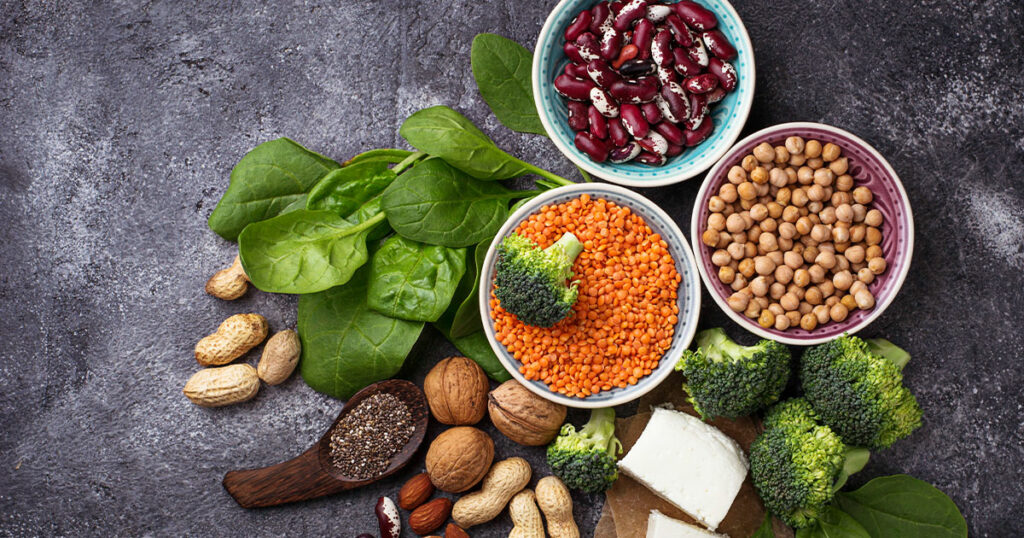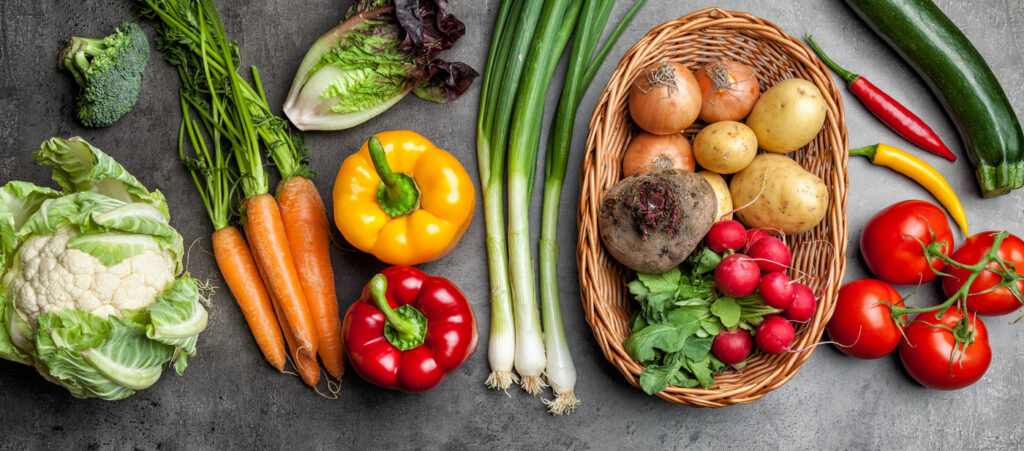To put it simply, a vegan diet is based entirely on plants (such as vegetables, grains, nuts, and fruits) and foods made from plants. Vegans do not eat foods that come from animals, such as eggs, dairy, and especially meat.

Veganism explained
Vegetarian and vegan diets are among the top food trends, but there is evidence that some people have been following this diet style for centuries. The term vegan was coined in 1944 Watson and Dorothy Morgan which marks “the beginning and end of vegetarian.”
People who follow a vegan diet are dedicated to plant-based foods and eliminate animal-based foods from their daily meals. Beyond just being a trend, many people who choose to go are doing so for the perceived health benefits or to advocate for animal rights.
Fundamentals of a vegan diet
There are a range of different types of vegan diets. For example:
- 80/10/10: The 80/10/10 diet is a low-fat, raw-food vegan diet that limits fat-rich plants such as such as avocados and nuts. It focuses on consuming raw fruits and soft greens and can also be known as a fruitarian diet.
- Fast-food vegan diet: This vegan diet does not deny you from the deliciousness of all your favorite, familiar foods. It includes a range of vegan meats and cheeses, fries, desserts and other plant-based processed vegan foods.
- Raw-food vegan diet: Think raw fruits, vegetables, nuts, seeds or plant foods that are cooked at low temperatures.
- Raw-till-four: Inspired by the 80/10/10 except raw foods are enjoyed until 4 p.m., followed by a cooked plant-based meal for dinner.
- Starch solution: A low-fat, high-carb diet that includes cooked starches like potatoes, rice and corn instead of fruit.
- Thrive diet: Followers of this plant-based dies eat raw, whole foods that are minimally cooked at low temperatures.
- Whole-food vegan diet: Unlimited restrictions in terms of whole plant foods such as fruits, vegetables, whole grains, legumes, nuts and seeds.
Since vegan diets are made up of all-natural food sources, these diets are rich in super nutrients like vitamins A, C, E and K, fiber, antioxidants and phytonutrients. Because of this, vegan diets have become the spotlight for scientific studies for their impact on human health.
Health benefits of a vegan diet
In theory, people who follow a vegan diet have a tendency to eat fewer calories and feel fuller due to foods that are higher in dietary fiber.
Research suggests that vegans tend to be thinner and have a lower body mass index (BMI) when compared to other diet types.
People who turn to a vegan diet may do so as a healthy alternative to lose excess weight.
However, a vegan diet alone is likely not to be the only reason why vegans are slimmer. Being a vegan often involves rigorous lifestyle changes that go beyond the foods being consumed. Vegans may also focus on more holistic and healthy lifestyle choices that include activities like weight lifting, yoga, and other health-related practices.
None the less, there are a variety of scientific papers that report the health benefits of a vegan diet. For example, a vegan diet may:
- Increase weight loss in overweight menopausal women1
- Improve glycemic and lipid control in people with type II diabetes2
- Lower cholesterol and blood pressure, as well as reduced risk of heart diseases3
- Decrease body fat in overweight adults4
More research is uncovering the benefits of a vegan diet. However, understanding the unique effects of vegan diets on human health is challenging because the eating patterns of individuals often vary and analyzing the long-term benefits of a diet without animal products are still needed.
Other health benefits of a vegan diet
Beyond weight loss, vegan diets are also known for providing the following health benefits:
- Cancer risk: Vegan diest can benefit from a 15% lower risk of developing cancer5
- Arthritis: Vegans appear to have significantly reduced symptoms of arthritis such as pain, morning stiffness, and joint swelling6,7
- Kidney function: Diabetics who switched from meat to a plant-based protein may reduce their risk of poor kidney function8,9
As mentioned, more studies are needed to verify the long-term benefits of a vegan diet. The following sources cited above are observational studies, however, vegan diets tend to have a higher intake of healthy foods.
How to eat a healthy vegan diet
It’s possible to get most of the nutrients you need from a balanced vegan diet.
Here’s what a healthy vegan diet looks like:
- eat at least 5 portions of a variety of fruit and vegetables every day
- include meals made from potatoes, bread, rice, pasta, or other starchy carbohydrates (preferably whole grains)
- add some dairy alternatives, such as soya drinks, nut-based milk, and vegan cheeses
- enjoy ample protein from beans and pulses
- get healthy fats from unsaturated oils and spreads
- drink plenty of water (ideally 6 to 8 cups per day)
This is just a simple guideline and if you plan on making a change in your diet, you should always consult a doctor to determine the right foods to maintain a healthy balance. You may need to supplement your vegan diet to ensure you are getting the right amount of energy and nutrients to fuel your lifestyle.

Vegan diet nutrient sources
Here are some of the vital nutrients your body needs along with which plants you can consume for a vegan diet:
Calcium and vitamin D
Calcium is vital for healthy teeth and bones. While non-vegans usually get their calcium and vitamin D from milk and other dairy products, these are a few foods that vegans can get thiers:
- brown and white bread
- dried fruit, such as raisins, prunes, figs and dried apricots
- fortified unsweetened soya, rice and oat drinks
- green, leafy vegetables – such as broccoli, spinach, cabbage and okra
- fortified unsweetened soya, rice and oat drinks
- sesame seeds and tahini
Sources of iron
Iron is critical for the production of red blood cells. Not having enough iron can lead to lightheadedness and other unwanted physical symptioms.
It can be challenging to maintain high iron as a vegan, because the body doesn’t absorb iron easily from meat as it does from plants. However, here’s what vegans can consume instead:
- breakfast cereals fortified with iron
- dark green, leafy vegetables, such as watercress, broccoli and spring greens
- dried fruits, such as apricots, prunes and figs
- nuts
- pulses
- wholemeal bread and flour
Omega-3 fatty acids
Omega-3 fatty acids helps to maintain a healthy heart as well as reduce the risk of heart disease. While it is commonly found in oily fish, vegans can get their source of omega-3 from:
- flaxseed oil
- soya oil and soya-based foods, such as tofu
- walnuts

Craving a delicious vegan meal?
Whether you choose to go all the way vegan or just want to enjoy an occasional healthy meal, I’m Your Vegan is here for all your fast food desires.
If you’re passing through Chiang Mai, Thailand — swing by for a vegan burger, milkshake, and fries.
See you there!
